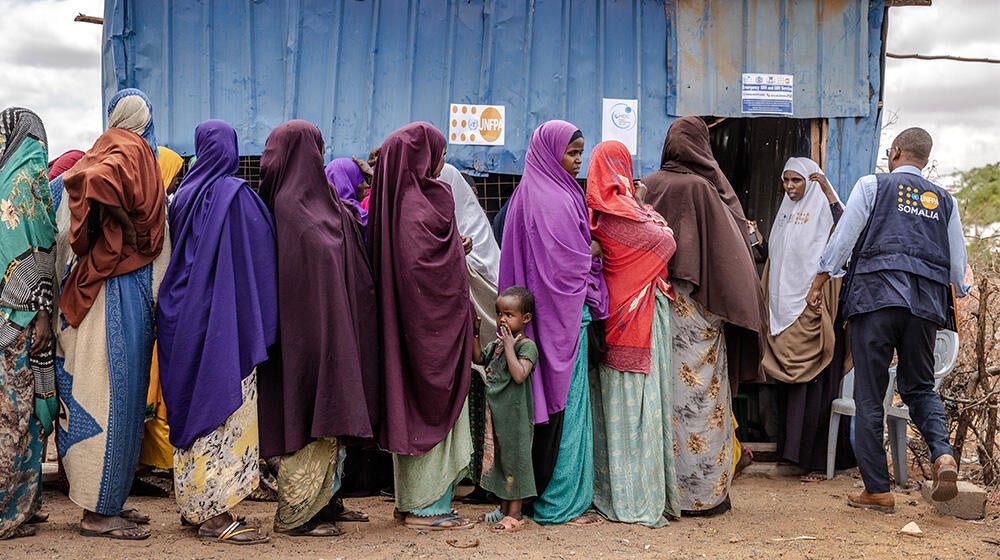Niyi Ojuolape, Country Representative, UNFPA - Somalia
Given the ongoing challenges of protracted conflict and climate mishaps like drought and floods, the humanitarian component of our work as UNFPA Somalia is of exceptional importance. According to the Somalia 2023 Humanitarian Needs Overview, over half of the Somali population needs life-saving humanitarian and protection assistance, with recurring climate challenges affecting over 8.25 million in the country. As obligated, UNFPA continues to deliver on our unwavering promise to be there for the most vulnerable. In the last year, UNFPA’s reproductive health services reached more than 500,000 women and girls in emergency settings in Somalia.
Earlier in the year, when conflict erupted in neighbouring Sudan, Somalia’s already precarious humanitarian situation came under increased pressure. We needed to respond to the needs of refugees with an additional layer of urgency and capacity. As part of the UN Coordination mechanism that was set up to respond to this, UNFPA played a pivotal role in ensuring that this was coordinated effectively, as our humanitarian officials and partners were able to swiftly establish women’s health spaces, emergency hygiene and dignity kits for the vulnerable population.
The Humanitarian Day commemoration is a momentous occasion to acknowledge the contribution of all humanitarian workers globally, especially our field officers who are navigating a complex humanitarian terrain to deliver the much-needed services. I am proud of our humanitarian hubs spread in different areas of Somalia and our dedicated officials on the ground assisting and implementing our humanitarian response programme at all costs. I am also thankful to our local partners and practitioners for providing sexual and reproductive health services in the temporary shelters we have set up within the emergency zone.
Of note, the life-saving assistance that humanitarians provide is needed now more than ever. And on this World Humanitarian Day, I am pleased to mention that we are scaling our emergency response capacity. Months ago, select UNFPA Somalia staff had the opportunity to participate in the International Midwifery Conference in Bali. While there, they interacted with other humanitarian responders, understanding what works in different contexts and improvisations that are critical during elevated levels of crisis. Also crucial to what was learnt from that experience is the need for humanitarian responders to pay closer attention to their mental well-being as they provide psychosocial support to traumatized populations. Further, we are increasing support for the local organizations best placed to meet the needs of affected communities in Somalia.
That said, urgent and increased investment in humanitarian responses are needed, particularly in protecting the health and safety of women and girls caught in humanitarian crises. In every emergency, our humanitarian response must prioritize sexual and reproductive health (SRH) and protection from gender-based violence. Women and families bear the brunt of displacement, enduring the discomfort of makeshift camps and fearful of being exposed to diseases. Far too often, the urgency of these services is overshadowed by more visible aspects of crisis relief, leaving women, and girls outside the attention loop. The time has come to recognize that SRH and GBV services are not just peripheral needs but the bedrock upon which any sustainable humanitarian crisis response must be built.
Further, increased investment in humanitarian response will provide additional capacity for us to focus more strategically on the needs of young people in UNFPA shelters. Establishing youth spaces and support with youth-led organizations within the IDP camps for young people is critical to our goal of leaving no one behind. In Somalia, young people are not merely beneficiaries of humanitarian responses; they are active members and mostly first responders during humanitarian crises. For example, when there are terror attacks, young people go to affected sites to provide first-aid to the injured, move them to the hospital and, when necessary, donate blood. We will ensure that the voices and rights of those most affected are heard and honoured; let us unite as a global family to ensure that no one is left behind, that their voices are heard, and that their rights are upheld
While reiterating our determination to stand alongside those facing humanitarian crises, we once again commend the sacrifices of our staff, technical partners and field officials who are on the ground to assist people going through the most vulnerable periods of their lives.



